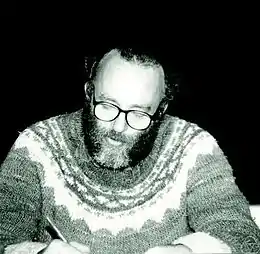Richard Pollack
Richard M. Pollack ( – [1] - [2]) est un mathématicien américain spécialiste de géométrie combinatoire.
Carrière
Il obtient un PhD à l'université de New York sous la direction de Harold Nathaniel Shapiro[3] avec une thèse intitulée « Some Tauberian Theorems in Elementary Prime Number Theory ». Il rejoint l'université de New York comme professeur. Il passe un semestre sabbatique à Montréal avec Willy Moser, et passe la majeure partie de sa carrière comme professeur au Courant Institute of Mathematical Sciences de l'université de New York, où il est professeur émérite jusqu'à sa mort
Contributions
Richard Pollack a travaillé en combinatoire extrémale, notamment avec Paul Erdős et János Pach ; en géométrie algébrique réelle avec Saugata Basu et Marie-Françoise Roy[4] - [5] - [6] - [7]
Pollack a également travaillé en géométrie discrète[8] - [9] - [10] - [11] - [12] - [13] - [14] - [15] - [16] - [17] - [18]. Son article avec Jacob E. Goodman comprend les premières bornes non triviales sur le nombre de types d'ordre et de polytopes[8] et une généralisation du théorème de la transversale de Hadwiger à des dimensions supérieures[9]. Lui et Goodman sont les rédacteurs fondateurs de la revue Discrete & Computational Geometry[19].
En combinatoire, Pollack publie plusieurs articles avec Paul Erdős et János Pach[8] - [9].
En géométrie algébrique réelle, Pollack écrit une série d'articles avec Saugata Basu et Marie-Françoise Roy[13] - [14] - [15] - [16] ainsi qu'un livre[20].
Récompenses
En 2003, un recueil d'articles de recherche originaux en géométrie discrète et computationnelle intitulé Discrete and Computational Geometry: The Goodman–Pollack Festschrift est publié en hommage à Jacob E. Goodman et Richard Pollack à l'occasion de leur 2/3 × 100 anniversaires[21].
En 2012, il devient membre de l'American Mathematical Society[22].
Un numéro spécial commémoratif de 556 pages de Discrete & Computational Geometry pour Pollack est publié en octobre 2020[23].
Références
- (en) Cet article est partiellement ou en totalité issu de l’article de Wikipédia en anglais intitulé « Richard M. Pollack » (voir la liste des auteurs).
- « Richard M. Pollack », Prout Funeral Home (consulté le )
- "Ricky Pollack", sent by Joseph S. B. Mitchell on behalf of the Computational Geometry steering committee to the compgeom-announce mailing list, September 19, 2018
- (en) « Richard M. Pollack », sur le site du Mathematics Genealogy Project.
- Paul Erdős, János Pach, Richard Pollack et Zsolt Tuza, « Radius, diameter, and minimum degree », Journal of Combinatorial Theory, Series B, vol. 47, , p. 73–79 (DOI 10.1016/0095-8956(89)90066-x
 )
) - Hubert de Fraysseix, János Pach et Richard Pollack, « How to draw a planar graph on a grid », Combinatorica, vol. 10, , p. 41–51 (DOI 10.1007/BF02122694
 , S2CID 6861762)
, S2CID 6861762) - János Pach, Richard Pollack et Emo Welzl, « Weaving patterns of lines and line segments in space », Algorithmica, vol. 9, no 6, , p. 561–571 (DOI 10.1007/bf01190155
 , S2CID 28034074)
, S2CID 28034074)
- Pankaj Agarwal K., Boris Aronov, János Pach, Richard Pollack et Micha Sharir, « Quasi-planar graphs have a linear number of edges », Combinatorica, vol. 17, , p. 1–9 (DOI 10.1007/bf01196127
 , S2CID 8092013, CiteSeerx 10.1.1.696.1596)
, S2CID 8092013, CiteSeerx 10.1.1.696.1596)
- Jacob E. Goodman et Richard Pollack, « There are asymptotically far fewer polytopes than we thought », Bulletin of the American Mathematical Society, vol. 46, , p. 127–129 (DOI 10.1090/s0273-0979-1986-15415-7
 )
)
- Jacob E. Goodman et Richard Pollack, « Hadwiger's transversal theorem in higher dimensions », Journal of the American Mathematical Society, vol. 1, no 2, , p. 301–309 (DOI 10.1090/S0894-0347-1988-0928260-1
 )
)
- Jacob E. Goodman et Richard Pollack, « Multidimensional sorting », SIAM Journal on Computing, vol. 12, no 3, , p. 484–507 (DOI 10.1137/0212032)
- Jacob E. Goodman et Richard Pollack, « Semispaces of configurations, cell complexes of arrangements », Journal of Combinatorial Theory, Series A, vol. 37, no 3, , p. 257–293 (DOI 10.1016/0097-3165(84)90050-5
 )
) - Jacob E. Goodman et Richard Pollack, « Foundations of a theory of convexity on affine Grassmann manifolds », Mathematika, vol. 42, no 2, , p. 305–328 (DOI 10.1112/s0025579300014613, CiteSeerx 10.1.1.48.3232)
- Saugata Basu, Richard Pollack et Marie-Françoise Roy, « On the number of cells defined by a family of polynomials on a variety », Mathematika, vol. 43, , p. 120–126 (DOI 10.1112/s0025579300011621)
- Saugata Basu, Richard Pollack et Marie-Françoise Roy, « On the combinatorial and algebraic complexity of quantifier elimination », Journal of the ACM, vol. 43, no 6, , p. 1002–1045 (DOI 10.1145/235809.235813, S2CID 9536962, CiteSeerx 10.1.1.49.3736)
-
Saugata Basu, Richard Pollack et Marie-Françoise Roy, « Computing roadmaps of semi-algebraic sets on a variety », Journal of the American Mathematical Society, vol. 13, , p. 55–82 (DOI 10.1090/S0894-0347-99-00311-2
 )
) -
Saugata Basu, Richard Pollack et Marie-Françoise Roy, « An asymptotically tight bound on the number of semi-algebraically connected components of realizable sign conditions », Combinatorica, vol. 29, no 5, , p. 523–546 (DOI 10.1007/s00493-009-2357-x
 , arXiv math/0603256)
, arXiv math/0603256) - Jacob E. Goodman, Richard Pollack et Bernd Sturmfels, « The intrinsic spread of a configuration in R^d », Journal of the American Mathematical Society, vol. 3, no 3, , p. 639–651 (DOI 10.1090/s0894-0347-1990-1046181-2
 )
)
- Sylvain Cappell, Jacob E. Goodman, János Pach, Richard Pollack, Micha Sharir et Rephael Wenger, « Common tangents and common transversals », Advances in Mathematics, vol. 106, no 2, , p. 198–215 (DOI 10.1006/aima.1994.1056
 )
)
- « Discrete & Computational Geometry », Discrete & Computational Geometry, Springer Science+Business Media (consulté le )
- Saugata Basu, Richard Pollack et Marie-Françoise Roy, Algorithms in Real Algebraic Geometry, vol. 10, Springer-Verlag, coll. « Algorithms and Computation in Mathematics »,
- Discrete and Computational Geometry: The Goodman-Pollack Festschrift, Springer, coll. « Algorithms and Combinatorics », (ISBN 9783540003717, lire en ligne)
- List of Fellows of the American Mathematical Society, retrieved 2013-05-26.
- (en) « Discrete & Computational Geometry | Volume 64, issue 3 », SpringerLink (consulté le )
Liens externes
- Ressources relatives à la recherche :
